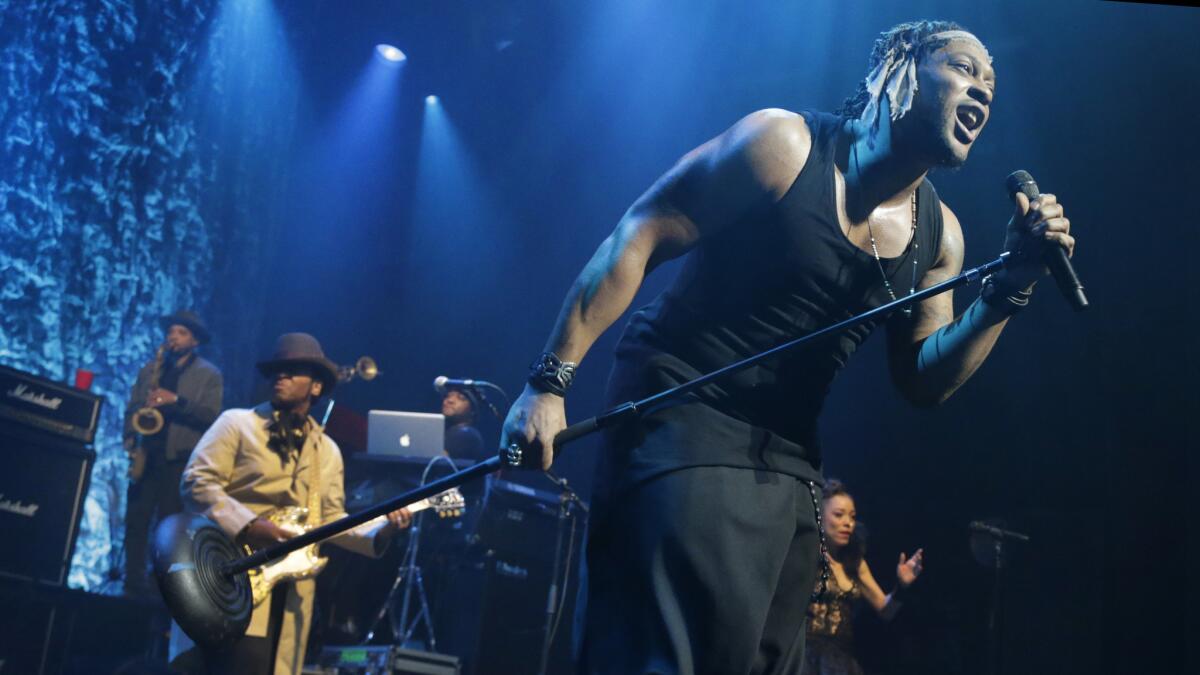D’Angelo & the Vanguard thrill Club Nokia with lesson in raw funk

Soul singer D’Angelo peforms at a sold-out Club Nokia on Monday.
- Share via
The masterful soul singer D’Angelo didn’t have much to say between songs during his euphoric Monday night set at Club Nokia. He offered no sermons on justice, didn’t footnote the messages on his new album, “Black Messiah,” had little time for banter.
No mention of the Ferguson summer, the death of Eric Garner, the weekend’s McKinney, Texas, pool party upload or any of the recent videorecorded confrontations between police and unarmed citizens.
D’Angelo’s actions and music, though, spoke volumes. Delivered as they were by a brilliantly practiced band of horns, guitars, backing vocals, keyboards, laptops and rhythms, the poses were as potent as pipe bombs.
As the band rolled into its opening song, “Ain’t That Easy,” singers held up their arms in the “hands up, don’t shoot” stance. During “The Charade,” D’Angelo, 41, performed in a black hoodie while singing precisely crafted lines about futility and frustration.
“Crawling through a systematic maze to demise, pain in our eyes,” he sang, the Vanguard moving through a thick, quick-tempoed groove made propellent by hand-claps and a meandering bass-line, made weird by a curious guitar melody. “Strain of drowning, wading through the lies / Degradation so loud that you can’t hear the sound of our cries.”
At the end of the song, band members raised their fists in a black-power salute, modern day Olympians using their platform to protest, foment, offer some kind of deliverance.
With a lubricated looseness, the artist drew on James Brown 1970s power funk, Parliament-Funkadelic’s muscular energy, Fela Kuti’s ridiculous brass bursts, the smooth Memphis soul of Al Green and Prince’s well-honed restlessness. Never derivative, D’Angelo offered a contemporary take on a timeless strand of American music. Compositions relied less on hooks and choruses than tectonic shifts in mood, the band roaming through inherited innovations while adding of-the-moment urgency.
That they accomplished this in a venue so crowded that many had to crane their necks added to the excitement -- though it also suggested that this show should have been at a bigger venue.
The Virginia-born son of a minister, who rose in the late-’90s as part of a so-called “neo-soul” movement, sang of pure love and the tingle of desire in rich falsetto on “Really Love.” In “Back to the Future (Pt. 1),” he wondered on vanishing time while trumpet and saxophone punctuated the subtle groove with the occasional melodic ellipses. During an instrumental break there and elsewhere, the artist and his singers moved through loosely choreographed moves like the Pips on quaaludes.
Throughout both new work and songs from 2000’s “Voodoo” and his 1995 debut, “Brown Sugar,” he merged the private and the political, explored in confident tenor his decade away from the music business and the lessons that he learned. This tour, which will return to Los Angeles for the FYF Festival in August, is traveling across the country over the next month.
Gritty, relentless and momentous, his musical platoon was so locked on their leader’s movements that when he counted off measures James Brown-style, the band shot forth a series of one- and two-note bursts that repeatedly struck the beat’s bull’s-eye.
He ordered and the band blasted with precision. I could be wrong on the number -- the moment was too charged to make complete sense of -- but at the end of “Sugah Daddy” I’m pretty sure he commanded 45 beats. The Vanguard immediately rolled through a series in rapid-fire succession, then stopping as if hitting a brick wall. Throughout the night the crowd, too, reacted on cue, offering stutter-step handclaps at D’Angelo’s behest, singing in unison the line, “How does it feel?”
As a music freak too young to have seen James Brown, Sly & the Family Stone or Funkadelic in their primes, I’ve long wondered how it would have felt to witness that brand of real-time exuberance, experience such a uniquely American expression of musical immersion, ride the proverbial Mothership. Now I know.
During the second of two encores, the artist moved into “Untitled (How Does It Feel),” the song that made him famous (and desirous) in 2000.
“How does it feel?,” he wondered with sublime sensuality, a wide-brimmed blue hat tipped sideways on his head, washes of brass, percussion and voices surrounding him. He and the band repeated it softly — “How does it feel?”
The musicians continued asking the question as, one by one, they exited the stage, until D’Angelo was alone, seated behind his keyboard, keying chords. “How does it feel?”
Monday night it felt sublime. It felt necessary, crucial, fueled by the kind of energy required of the times. It felt thrilling to witness an artist not only rising to the occasion but overwhelming it.
Follow Randall Roberts on Twitter: @liledit
More to Read
The biggest entertainment stories
Get our big stories about Hollywood, film, television, music, arts, culture and more right in your inbox as soon as they publish.
You may occasionally receive promotional content from the Los Angeles Times.











